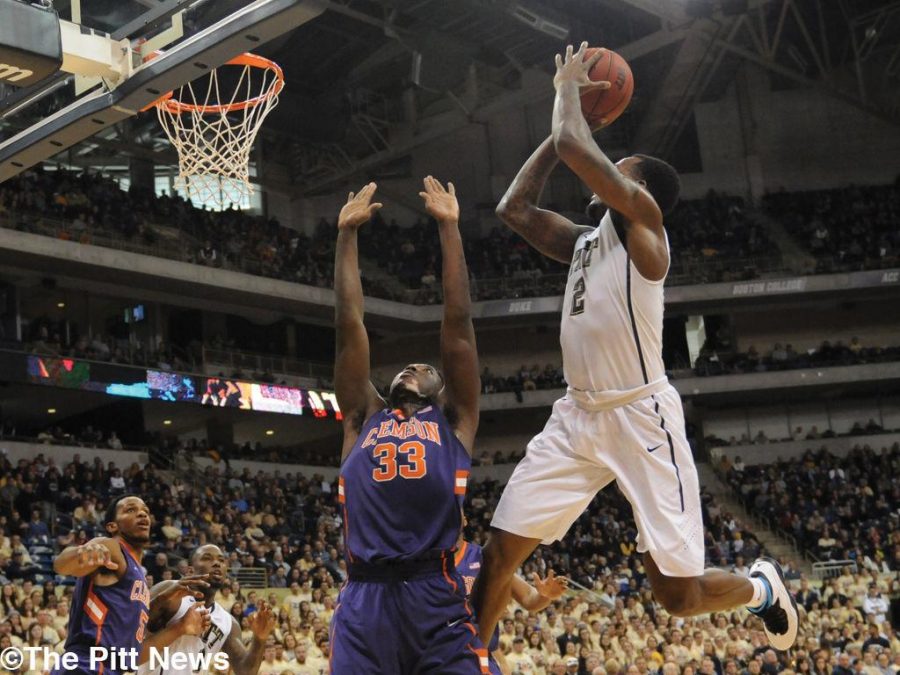Rebounding an ongoing shortcoming for Panthers
January 11, 2015
After an underwhelming start to the 2014-2015 season and a disappointing 1-2 record to begin ACC play, the Pitt men’s basketball team has a big problem — literally.
Under head coach Jamie Dixon, the Panthers program has been noted for the team’s physical play, and it almost always had a large, strong center manning the paint. From eventual NBA players like DeJuan Blair, Aaron Gray and Steven Adams to productive big men like Gary McGhee and Talib Zanna, Dixon’s teams have seemingly always benefited from having a sizable rim protector.
This year, however, Pitt lacks its usual brawn, and opposing coaches have taken notice.
“In the past, when we played them, they had a big, strong man in there,” Oakland University head coach Greg Kampe said following an overtime loss to the Panthers in December. “They don’t have that this year. I’m not sure they have that post defender that they’ve had in the past.”
While starting center Mike Young is, undoubtedly, a skilled player, he isn’t the type of player that Dixon traditionally trots out at center.
At 6-foot-9-inches tall and 235 pounds, Young has thrived offensively down low this season, boasting a strong post-game and a knack for drawing fouls — he’s averaging nearly five free throw attempts per game. But, as Kampe noted, there isn’t the same level of physicality down low that Pitt consistently displayed during Dixon’s 12-year tenure as head coach.
That missing tenacity was apparent Saturday afternoon throughout Pitt’s 71-62 loss to the Clemson Tigers. It was a defeat that was sealed in the paint, as Clemson outrebounded the Panthers by a margin of 39-22.
The 22 rebounds tied for the lowest total in a game since Dixon became head coach, matching the total Pitt posted against Kansas State earlier this season in Maui. The 17-rebound deficit was also the largest ever under Dixon.
While Clemson forward Jaron Blossomgame did praise Pitt’s intensity, he said the Tigers simply one-upped them.
“It’s very important to win on the glass, and Pitt is a very physical team,” Blossomgame said. “But, in the interior, we’re a lot bigger than they are, so it was important to win the rebounding battle. We’re really hungry right now.”
When asked if he thought that Clemson “wanted it” more than Pitt, Blossomgame added, “Yeah, I’d agree with that.”
Pitt senior guard Cameron Wright echoed those sentiments after the game.
“We have to give Clemson credit. They came in here and kicked our tails on the glass,” Wright said. “It’s pretty obvious that when we lose the rebounding numbers, we lose the game.”
“It’s plain and simple. They wanted it more than us,” Wright added later.
Dixon expressed obvious frustration regarding the rebounding margin in his post-game press conference.
“[Clemson] played well. We didn’t,” Dixon said. “The obvious number that stands out is rebounding. To get beat this bad on the boards is even more difficult to realize.”
The rebounding struggle isn’t unique to Saturday’s game. Pitt ranks 195th in the nation in rebounds per game (34.6) and ranks even lower when limited to defensive rebounds – tied for 307th (21.7). Those marks also are good for third-to-last and last in the ACC, respectively.
That isn’t to say that the blame for the struggles on the glass are entirely due to the lack of a big body. Wright also cited positioning as a key point of weakness.
Still, as Kampe pointed out, size and physicality were crucial factors to Pitt’s success in years past. The Panthers desperately need to find the next one — whether it’s Young or someone else — or Saturday’s result could become a common occurence.








